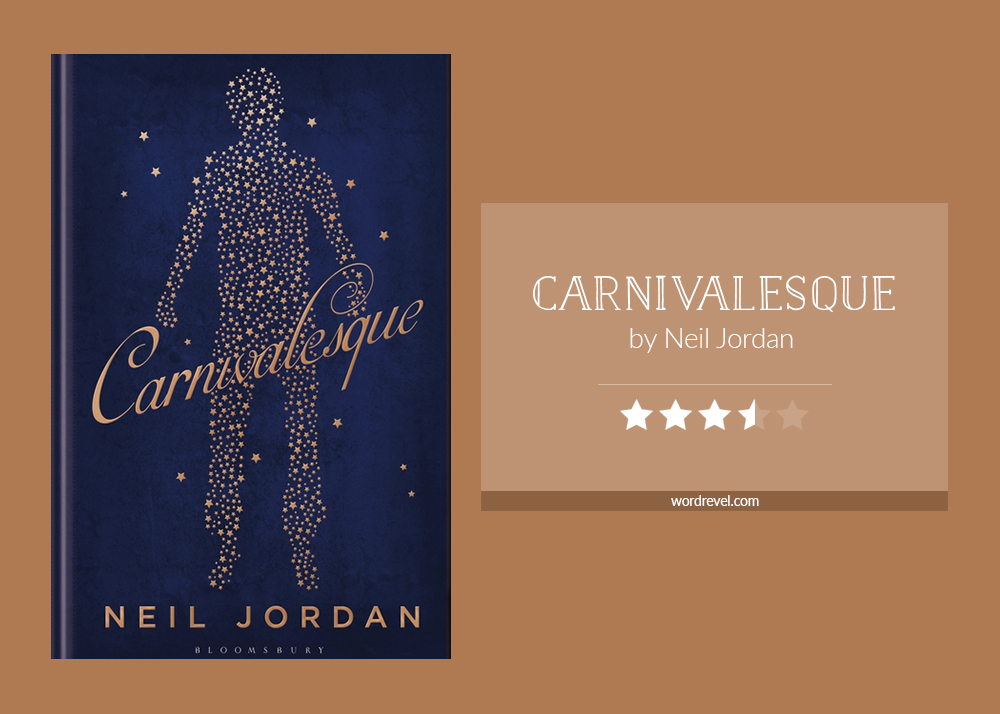Disclosure: I received a review copy of Carnivalesque from Pansing Books, a regional distributor, in exchange for an honest review. This does not affect my opinion of the book or the content of my review.
 Carnivalesque by Neil Jordan • contains 288 pages • published February 23, 2017 by Bloomsbury Publishing • classified as Literary Fiction, Urban Fantasy, Fantasy, General Fiction • obtained through Pansing Books • read as ARC • shelve on Goodreads
Carnivalesque by Neil Jordan • contains 288 pages • published February 23, 2017 by Bloomsbury Publishing • classified as Literary Fiction, Urban Fantasy, Fantasy, General Fiction • obtained through Pansing Books • read as ARC • shelve on Goodreads Synopsis:
It looked like any other carnival, but of course it wasn’t. The boy saw it from the car window, the tops of the large trailer rides over the parked trains by the railway tracks. His parents were driving towards the new mall and he was looking forward to that too, but the tracery of lights above the gloomy trains caught his imagination...
Andy walks into Burleigh’s Amazing Hall of Mirrors, and then he walks right into the mirror, becomes a reflection. Another boy, a boy who is not Andy, goes home with Andy’s parents. And the boy who was once Andy is pulled—literally pulled, by the hands, by a girl named Mona—into another world, a carnival world where anything might happen.
Master storyteller Neil Jordan creates his most commercial novel in years in this crackling, filmic fantasy—which is also a parable of adolescence, how children become changelings, and how they find their own way.
Of Magic and Intrigue
Carnivals and circuses have fascinated me since I was young. Even today, I still am taken in by magical atmosphere — the way time stops and visitors are transported into an almost otherworldly realm. This wonderment is something I thought Neil Jordan captured immensely well in his latest novel, Carnivalesque. The setting held a great deal of intrigue and carried a mysterious air. This was especially brought out throughout the eyes of the main character, Andrew, who was a young boy.
Distanced from Carnivalesque
Reading Carnivalesque was like staring at a snow globe — it was enthralling but divorced me of deeper engagement. That disappointed me a little. Carnivals, and even books about carnivals, tend to make me forget myself. In this case, I couldn’t lose myself in the book. The prose occasionally conveyed beauty but most of the time, it was longwinded, sometimes even failing to bring across any point at all. The plot also meandered and seemed to lead nowhere half the time.
When neither plot nor prose wow me, I need the characters to be outstanding. I expect to connect to them , or in the very least, to empathise. Carnivalesque didn’t offer that either. While I pitied the characters’ plights, I felt a gaping lack of empathy. That distance coupled with a great sense of unknowingness left me floating throughout the book.
Challenging the Mind
On an intellectual level, however, Carnivalesque did challenge me. The notion of changelings always begs the question of identity. This is an aspect that Neil Jordan explored very well. Who was Andrew vis-á-vis the boy who had taken his place? Perhaps if I’d been familiar with Irish folklore, I might have had more appreciation for Carnivalesque. Sadly, any related parallels completely passed me by.
On the whole, the setting was what made this book memorable for me. That, and some morbid moments that blurred the lines between the living and the dead.
